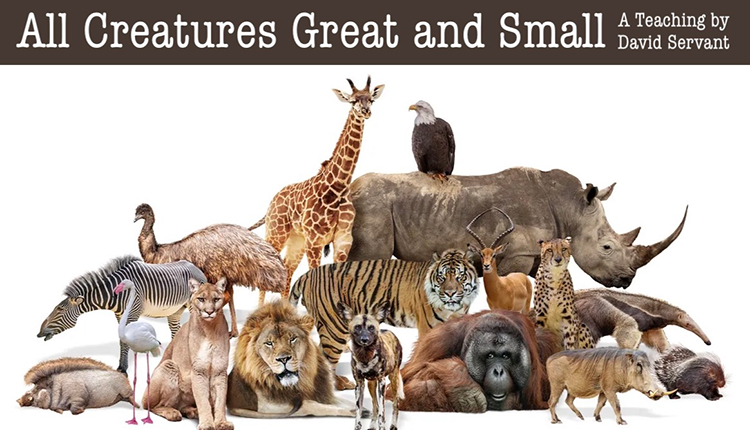
It is impossible to go through life ignoring God’s creatures. Who can say they haven’t noticed birds, spiders, squirrels, ants, and an occasional raccoon? Those creatures are part of our divinely-planned existence, and they, like all the rest of creation, serve to arrest our attention, provoke us to ponder, and draw us into a relationship with God. They not only reveal God’s incredible power and amazing creativity, but they serve to teach us about ourselves (“Like sheep, we’ve all gone astray.”) And they even affirm moral truths that reside in every conscience. It is amazing—and tragic—that most people are not amazed by the divine display that is paraded before them all their lives.
Let’s think about this a little more…
Although we may marvel at unique abilities God has granted the many creatures He’s made, we are glad we are not them. Birds fly, and some ants carry 10 to 50 times their weight. We might be slightly jealous, but none of us wish we were a bird or ant. We know we possess an overall superiority and a much richer quality of life. Have you ever thought, as you drove past a heard of grazing cows, “I’m glad I’m not a cow”? I have. That thought should provoke me to question why God, who could have made me a cow, created me in His image. The answer is that humans uniquely possess an opportunity to have a relationship with God, to be His sons and daughters. Every lower form of life—every bird, insect and mammal—is sending that message to us all our lives.
We often observe animals interact, and we make moral appraisals. For example, when birds fight each other over food, we judge them as being selfish. Similarly, when a carnivore attacks and kills a weaker member of some other species, we feel sympathy towards the victim and some degree of disapproval towards the victor. And when bees make honey, we approve of their hard work and cooperation. All of these intuitive emotions testify that God has written His laws in our hearts. We know right from wrong. We find fault in the selfishness of creatures of much lesser intelligence, yet we suppress the guilt that arises within us for our own selfishness. It’s all designed by God to give us no excuses—and to bring us to repentance.
The food chain, to which all living things belong, teaches us that life for one requires the death of another. Even the grass was alive and growing before it was eaten by the cow. We generally don’t feel sorry for the grass, but who hasn’t felt sorry for the fish eaten by the shark? Yet God has given the shark no other way to survive, and equipped him to that end. Something marvelous dies so that something else can live. It seems unfair. But there is a divine lesson in it. Have you thought about it? One day, when that lesson is no longer needed, “The wolf and the lamb will graze together, and the lion will eat straw like the ox” (Is. 65:25).
Are you paying attention? “Lord, open our eyes!”

